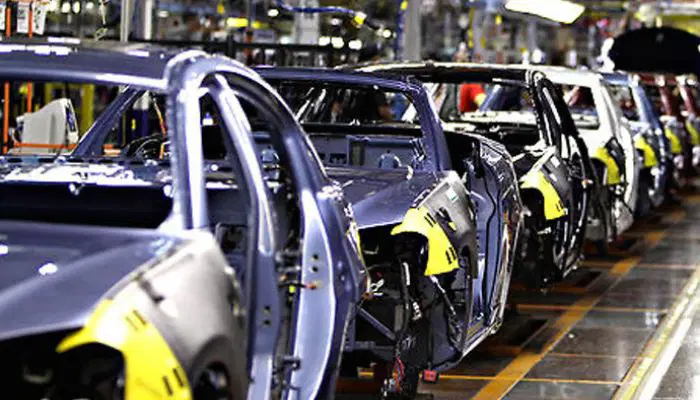Tech
ByteDance-owned TikTok slashes hundreds of jobs in shift towards AI content moderation
Published
6 months agoon
By
Ekwutos BlogShort-video platform TikTok currently employs a mix of automated detection and human moderators to review content posted on the site
ByteDance-owned social-media platform TikTok is laying off hundreds of employees from its global workforce, including a large number of staff in Malaysia, the company said on Friday, as it shifts focus towards a greater use of artificial intelligencein content moderation.
Two sources familiar with the matter earlier told Reuters that more than 700 jobs were slashed in Malaysia. TikTok later clarified that less than 500 employees in the country were affected.
The employees, most of whom were involved in the firm’s content-moderation operations, were informed of their dismissal by email late on Wednesday, according to the sources, who requested anonymity because they were not authorised to speak to media.
Do you have questions about the biggest topics and trends from around the world? Get the answers with SCMP Knowledge, our new platform of curated content with explainers, FAQs, analyses and infographics brought to you by our award-winning team.
In response to queries, TikTok confirmed the lay-offs and said that several hundred employees were expected to be affected globally, as part of a wider plan to improve its moderation operations.
TikTok employs a mix of automated detection and human moderators to review content posted on the site.
Beijing-based ByteDance has over 110,000 employees in more than 200 cities globally, according to the company’s website.
The world’s most valuable start-up – with a valuation close to US$230 billion, according to a report last month by The Information – is also planning more retrenchments next month, as the firm looks to consolidate some of its regional operations, one of the sources said.
“We’re making these changes as part of our ongoing efforts to further strengthen our global operating model for content moderation,” a TikTok representative said in a statement.
The company expects to invest US$2 billion globally this year in various trust and safety initiatives and will continue to improve efficiency, with 80 per cent of guidelines-violating content now removed by automated technologies, the representative said.

Several hundred TikTok employees globally are expected to be affected by the short-video platform’s latest round of job cuts. Photo: Shutterstock
The lay-offs were first reported by business portal The Malaysian Reserve on Thursday.
The job cuts occur as global technology firms face greater regulatory pressure in Malaysia, where the government has asked social media operators to apply for an operating licence by January in line with efforts to combat cybersecurity offences.
Malaysia reported a sharp increase in harmful social media content earlier this year and called on firms, including TikTok, to step up monitoring on their platforms.
More Articles from SCMP
China’s stimulus measures just first step on economic reform journey
Kazakhstan sees more ‘close coordination’ with China in platforms like UN, SCO
China’s Mexico investment may dwarf official figures, with estimated US$13 billion in play
China’s C919 jet, US presidential election: SCMP’s 7 highlights of the week
This article originally appeared on the South China Morning Post (www.scmp.com), the leading news media reporting on China and Asia.
You may like


“My Journey to Becoming a Traditional Healer Was a Sacred Calling from the Almighty” – Yul Edochie


PRESIDENT TINUBU CELEBRATES DR OLADELE FAJEMIROKUN ON 75th BIRTHDAY


The night hired killers tried to assassinate my father – Bishop David Oyedepo’s daughter


Wike not PDP’s problem – Dan Orbih reveals those behind party crisis


FORMER CPC LEADERS IN APC REAFFIRM LOYALTY TO PARTY, PRESIDENT TINUBU


Dangote Refinery has once more reduced the prices of its fuel, lowering the ex-depot rate to N835 per liter.
Tech
They only know how to drain data’ – Telecom consumers lament tariff hike, poor network
Published
2 days agoon
April 14, 2025By
Ekwutos Blog
Some telecommunication services consumers in the Federal Capital Territory, FCT have urged Mobile Network Operators to improve their services to match the recent hike in their tariffs.
They made the call in separate interviews with NAN on Monday in Abuja.
The subscribers said despite the increase in subscription rates mobile networks could remain epileptic for hours.
In a publication dated February 6, 2024, the Executive Vice-chairman of the Nigerian Communications Commission, Dr Aminu Maida, said that the commission would hold service providers accountable for poor service delivery.
Mr Ogah Paul, one of the subscribers said he had enough data on his network but could not access the internet because of the epileptic network.
He urged service providers to fix the problems surrounding the poor services.
“The only thing they know is to drain data without any good service delivery. I feel like crying because of a problematic network. I have been receiving server errors since morning.
“To even download and watch a video sent to me since, takes me almost one whole day. “I wonder if members of staff of the service providers are enjoying the service they render to us.
“We cannot make calls, access the internet or even receive calls,’’ he said.
According to him, unfortunately, the network providers put up some of the best adverts about their products and services which they cannot meet.
Mr Victor James, another subscriber said he had enough data but was not able to use it to his satisfaction.
“Why does their data plan not reflect immediately when you buy data? Sometimes it takes as much as 24 hours to reflect.
“I am tired of this. The network is really bad. I have enough data but I cannot use it the way I want.
“I hope the issues get resolved as soon as possible so that I can access my data without further delay,” he said.
However, Ms Josephine Tanko, told NAN that she had no problems with her network providers.
“It is fast and reliable. I think it is the network that gives the best internet speed and quality.
“It will always be my best that is why I will always choose it over any other network,” she said.
She called on networks that did not meet their subscriber’s expectations to ensure that they improved their services.

By Adegboyega Adeleye
The importance of cars in transportation cannot be overemphasised with some countries known for their production.
Transportation is required for work, school, and industry, with car production fast becoming a major producer of revenue and a player in the global was financial market.
Car production is one of the largest economic sectors internationally; however, some countries produce more cars than others. The list of countries by motor vehicle production is based on statistics by the International Organization of Motor Vehicle Manufacturers.
The world’s car manufacturers put another 93.5 million vehicles on the roads in 2023, the last full-year numbers currently available.
This article will explore the top 5 countries with the highest car production.
1. China
China, the world’s biggest manufacturer overall, leads the world in car production. The country’s 2023 production totaled more than 30 million vehicles, adding up to more than 30% of all cars and trucks produced globally.
The largest domestic car manufacturers in China, known as the traditional “Big Four,” are SAIC Motor, Dongfeng, FAW, and Chang’an.
2. United States
The United States–a major automotive producer, known for its large vehicle market–is the second biggest auto manufacturing country with a volume of 10,611,555. This represents about 5.5 percent growth compared to the 10,060,339 produced in 2022.
The United States produces less than half of what China does, having manufactured about 1.8 million cars and 8.3 million commercial vehicles in 2022. The United States’ largest car manufacturers, referred to as the “Big Three,” are General Motors, Ford Motor Company, and Fiat Chrysler.
3. Japan
Japan ranked as the third biggest automobile-producing country in the world with a total volume of 8,997,440 vehicles manufactured in 2023. The country is a significant player in the global automotive industry, known for its engineering and quality.
After a sudden drop in production from 2020-2022 due to the COVID-19 pandemic, Japan produced just under 9 million vehicles in 2023 (8,997,440)–a drop from its pre-COVID total of nearly 9.7 million in 2019.
However, the volume grew by 14.8 percent compared to the 7,835,519 produced in 2022.
Japan’s automotive industry is one of the largest industries in the world. The country’s automotive manufacturers include Toyota, Honda, Daihatsu, Nissan, Suzuki, Mazda, Mitsubishi, Subaru, Isuzu, etc.
4. India
India is the fourth-largest automobile-producing country in the world with a total number of 5,851,507 manufactured in 2023. The volume of vehicles grew by 7.2 percent compared to 5,456,857 vehicles produced in 2022.
Although, India is not renowned in America or Europe as a vehicle manufacturer, the Asian nation produced 5.8 million cars in 2023– an annual increase of 7%. India’s export markets for vehicles include Saudi Arabia, South Africa, and Mexico.
The nation is rapidly growing as an automotive market and producer.
5. South Korea
South Korea is the fifth-largest auto-producing country in the world. The country manufactured a total of 4,244,000 vehicles in 2023, representing a growth of 13 percent from a total of 3,757,049 vehicles produced in 2022.
The major South Korean automobile manufacturers include GM Korea, Hyundai Motor Group and its affiliate, Kia Corporation along with Renault Korea Motors.
Tech
A lot of people don’t know this but do you know that all your internet connections and services are powered by Glo, not all but majority is powered by an under see cable called GLO1 THAT’S owned by Glo1.
Published
4 days agoon
April 13, 2025By
Ekwutos Blog
Now because they make more money from this than selling as retailers that’s why they don’t care about their ISP SERVICE in retail quantities.
It’s like a bakery, they are most focused on selling to bulk buyers than single house hold user’s.
So you MTN, GLO AND ALL THAT are mostly connected to GLO1 even banks and may other platforms.
Ok let me break everything down.
1. Glo’s GLO-1 Cable:
GLO-1 is a private submarine cable owned by Globacom. It stretches from Nigeria to the UK and connects several West African countries. It was Nigeria’s first privately owned international submarine cable, launched around 2010.
Key Facts about GLO-1:
• Length: Over 10,000 km.
• Capacity: Designed for up to 2.5 Tbps.
• Landfall points: UK, Portugal, Senegal, Côte d’Ivoire, Ghana, and Nigeria.
• Purpose: Meant to reduce dependence on SAT-3 and provide high-speed internet capacity.
⸻
2. Why Glo May Not Focus Heavily on Retail ISP Services:
Glo essentially plays two roles:
• Infrastructure owner (wholesaler)
• Internet provider (retailer)
The wholesaling of the GLO-1 cable (and other bandwidth infrastructure) can be significantly more profitable and less stressful than managing millions of data subscribers in Nigeria with high expectations and poor last-mile infrastructure.
So yes:
Glo likely focuses more on selling bulk bandwidth to big clients than pleasing end users.
⸻
3. Who Are Glo’s GLO-1 Subscribers (Wholesale Clients)?
These can include:
• Telecom companies: ISPs, other mobile network operators.
• Banks and financial institutions.
• Tech companies and data centers.
• Government institutions.
• Educational institutions (for broadband research/academic access).
• CDNs and enterprise clients (e.g., Netflix, Google, Meta might use transit partners who tap into GLO-1).
4. How Many Submarine Cables Does Glo Own?
• Only One: GLO-1 is the only submarine cable Globacom directly owns.
• However, Glo might lease or partner to access others like:
• SAT-3 (older system, via NITEL/NTEL)
• ACE, WACS (via partnerships or regional consortiums)
So , Glo’s focus on being a wholesale bandwidth provider through GLO-1 might be one reason why their retail ISP service suffers in terms of customer satisfaction. They’re likely making more consistent revenue selling to institutions, ISPs, and data centers than from individual subscribers who demand high-quality, stable data service — which requires serious investment in towers, backhaul, and customer service
Copyright of Isaac Rocks Adeiza (Original Owner must be tagged to any Redistributions of content)
Content can’t not be redistributed for profit purposes.

“My Journey to Becoming a Traditional Healer Was a Sacred Calling from the Almighty” – Yul Edochie

PRESIDENT TINUBU CELEBRATES DR OLADELE FAJEMIROKUN ON 75th BIRTHDAY

The night hired killers tried to assassinate my father – Bishop David Oyedepo’s daughter
Trending

 Trending6 months ago
Trending6 months agoNYA demands release of ‘abducted’ Imo chairman, preaches good governance
- Business6 months ago
US court acquits Air Peace boss, slams Mayfield $4000 fine

 Politics6 months ago
Politics6 months agoMexico’s new president causes concern just weeks before the US elections
- Entertainment6 months ago
Bobrisky transferred from Immigration to FCID, spends night behind bars
- Entertainment6 months ago
Bobrisky falls ill in police custody, rushed to hospital

 Politics6 months ago
Politics6 months agoRussia bans imports of agro-products from Kazakhstan after refusal to join BRICS

 Politics6 months ago
Politics6 months agoPutin invites 20 world leaders
- Politics1 year ago
Nigerian Senate passes Bill seeking the establishment of the South East Development Commission.

